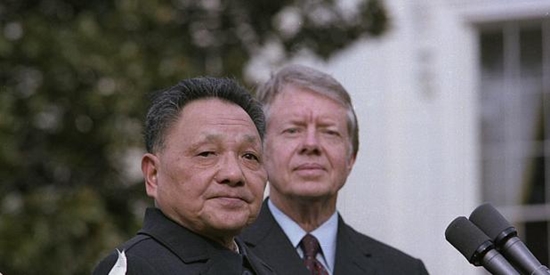
To judge by the headlines, the new space race is between Red China and the U.S. in the field of artificial intelligence.
The Financial Times reports that the World Intellectual Property Organization “recently published a patent landscape report on generative AI that showed China was responsible for more than 38,000 filings between 2014 and 2023, compared with 6,276 by the US over the same period.”
Beijing is not shy about its goals. At one of the government’s English-language websites, we are told that China plans “to become the world’s major AI innovation center by 2030, with the scale of its AI core industry exceeding 1 trillion yuan (about 140.9 billion U.S. dollars), and the scale of related industries exceeding 10 trillion yuan.”
Policy to people
Eric Schmidt, former Google CEO, says we’re in a race “between the U.S. and China. Both countries have a willingness, a goal, a national policy. They have the capital, they have the energy and they have the people, at scale, that almost no other country has. That fight is the epic fight.”
The futurologists used to imagine that an Internet of things (IoT) would underlie the technology of everyday life. A new future envisions AI in that role. Of course, if AI were to power the IoT, we could have the risk of both worlds.
The IoT visionaries imagined simple step logic being powered by sensors. Your fridge records low weight in the milk container and signals your phone, and you are cued to buy more.
Now, however, powered by AI, the refrigerator writes a hit song about being low on milk and posts it to Spotify; and by the time you get home from work, the royalties have started rolling in, enough to buy as much milk as you need.
But is there now fresh milk at home? In the minds of many people, the frightening scenario is that the milk has not been bought or delivered because the AI is off doing its own thing…and thus perishes the human race.
In a world where people long to delegate so much human agency for so little convenience, it should rightly be worrisome to have a communist dictatorship and international rival controlling the underlying AI operations of all American work, education, and everyday life.
This is currently the way the problem is presented. Alarmists thus think of the competition as a question of controlling the operating system of (potentially) all usable technology.
Hold on
But a word about operating systems. Many of us still remember the ironclad grip that the CP/M operating system had on the small computer market…until the inferior QDOS (“Quick and Dirty Disk Operating System”) of Bill Gates upended things.
Operating systems come and go.
And so, unlike the OpenAI models (America’s models) that power ChatGPT, “many of these Chinese companies are developing open-source [Large Language Models] that developers can download and build on top of for free and without stringent licensing requirements from the inventor.”
That it’s open source means that people can modify the code. The ability to build applications on top of it means that developers owe no royalties. Lack of stringent licensing means that creators fear no lawfare. This powerful combination of features can change a commercial landscape.
According to Xin Sun, a lecturer on Asian business at Kings College London, Chinese companies see LLMs “as the center of future tech ecosystems. Their future business models will rely on developers joining their ecosystems, developing new applications based on the LLMs, and attracting users and data.”
This is a big if, really.
The few U.S. tech firms involved in AI are not building operating-system equivalents.
Trojan horse
One danger mentioned in a report by American Edge Project is that China is using its rapidly advancing open-source ecosystem “as a Trojan horse to implant its CCP values into global infrastructure. The report outlines how Chinese AI models censor historical events that could paint China in a bad light, deny or minimize human rights abuses, and filter criticism of Chinese political leaders.”
In an open-source environment, one can, of course, edit out communist filters. In a regulated environment, one cannot.
So to lawmakers, Beijing’s AI rulemaking needs an answer. Early in 2023, Senator Chuck Schumer announced plans to regulate AI. He described China’s efforts “as a ‘wake up call to the nation,’ warning that the United States could not afford to let its geopolitical adversary ‘write the rules of the road’ for AI.”
How China’s rules would apply in our own markets is not clear.
Some of these communist rules are quite interesting. For example, according to draft rules issued in April 2023, “tech companies will be obligated to ensure AI-generated content upholds the ideology of the CCP including Core Socialist Values, avoids discrimination, respects intellectual property rights, and safeguards user data.”
By October 2023, China was mandating that AI-generated content “may not ‘incite subversion of state power or the overthrowing of the socialist system.’ Before releasing a large language model to the public, companies must seek approval from the CAC [the Cyberspace Administration of China] to certify that the model refuses to answer certain questions relating to political ideology and criticism of the CCP. Questions related to politically sensitive topics such as the 1989 Tiananmen Square protests and massacre or comparisons between Xi Jinping and Winnie the Pooh must be declined.”
Are these the rules of the road that Schumer wants to supplant with our own?
EU is already there
Be careful in trying to out-communist the Reds, Mr. Schumer, for the European Union will always get there first. In this year’s EU AI Act, we see that “This Regulation should be applied in accordance with the values of the Union enshrined as in the Charter.” In other words, the tech is to be subordinate to politics “in accordance with Union values.” AI must ensure “a high level of protection of health, safety, fundamental rights as enshrined in the Charter of Fundamental Rights of the European Union…, including democracy, the rule of law and environmental protection.”
The EU has given U.S. tech companies like Meta 36 months to comply.
As we saw with the introduction of Google Gemini, the United States doesn’t need this sort of charter. Our Silicon Valley firms front-load software with their own political values, values which just happen to mesh nicely with those of the outgoing Biden Administration.
Global dominance by Chinese AI will depend on these variables: adoption in foreign markets; expansion internationally through open source development; alliance building to organize foreign technical networks; and, not least, the goodwill of foreign governments.
Are we looking at global dominance then? Place your bets. □
James Roth works for a major defense contractor in Virginia.





